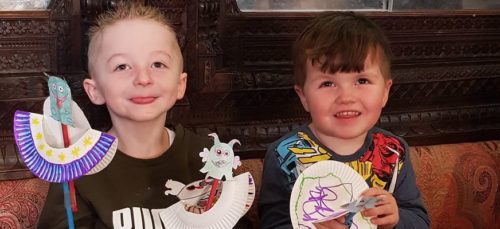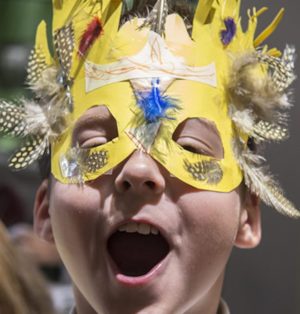 Arts Award, supported by our partners at Hastings Museum and the Arts Council, is a range of unique qualifications that supports young people to grow as artists and arts leaders, inspiring them to connect with and take part in the wider arts world through taking challenges in an art form - from fashion to digital art, pottery to poetry. Doing Arts Award at home works well if you can give a bit of help and guidance and better still if you’re able to join in. To see how easy it is, click here for your Arts Award Discover booklet from the Hastings Museum website.
Arts Award, supported by our partners at Hastings Museum and the Arts Council, is a range of unique qualifications that supports young people to grow as artists and arts leaders, inspiring them to connect with and take part in the wider arts world through taking challenges in an art form - from fashion to digital art, pottery to poetry. Doing Arts Award at home works well if you can give a bit of help and guidance and better still if you’re able to join in. To see how easy it is, click here for your Arts Award Discover booklet from the Hastings Museum website.
Five steps to an Award
 Through progressing through the five levels, young people get to:
Through progressing through the five levels, young people get to:
- discover the enjoyment of creating and participating in arts activities
- experience arts events
- develop creative and communication skills that are essential for success in 21st century life
- explore the work of artists and craftspeople and gain insights into the professional arts world
- gain experience and knowledge to help progress into further education and employment
There are no entry requirements, no time limit for completing the award, and no set rules on how to present final work.
The Arts Award scheme
How long does it take?
You can complete Arts Award Discover in one day or take a few weeks to work through all three sections, doing a bit at a time. If your child or children are especially interested in one part, you can add more pages – as many as you like. Some children end up with a big folder full!
If you’re feeling adventurous, you can have a go yourself. Add pages to your child’s folder or make your own Arts Award Discover portfolio.
You just need:
- Paper
- Drawing stuff like pens, pencils and crayons
You can download a copy of our Arts Award Discover booklet here and either complete it on screen, print a copy, or make your own folder, using the same headings. The page headings are important if you want a certificate at the end.
Other materials you could find useful include:
- Scissors, glue, junk modelling stuff like packaging, old magazines for collage
- Paint, pastels, charcoal sticks, chalk
- Dressing up things for acting or performing
- Instruments, real or home-made, for any musical adventures
- A camera/phone for taking pictures of children's artwork or performance
Look through the booklet with your child and talk about the three different parts of the Arts Award, so they have a good idea of what they’re doing from the start.
Sometimes we don’t notice the arts that surround us – from stories in books, actors on the TV and dancers on videos to drawings, paintings and pottery, whether made by professionals or family and friends. Encourage children to take a good look around at all the creative things in our lives. You could use this guide from Arts Award to make your own art spotter wheel.
Or take a look at ArtUK's Bexhill Museum page, a fantastic resource where you can explore lots of art from our local area and other places too.
Have a go! You need to take part in at least two different kinds of art. This could be things you do already or something new. Why not make up a dance, write a song, create a poem, illustrate a story or make models from packaging and other ‘junk’ materials?
Take a virtual tour of Bexhill Museum and look for art ideas linked to our collections.
Watching a film or play, listening to music or reading a book can all count. Focus on the creative impact of what you have seen or heard. It might be useful to think about how different it might have been if you had seen/heard something live rather than as a recording. What do you think the atmosphere is like when at a concert or the theatre, the difference in effects, smells, lighting etc.
Finding out about amazing local artists and art works in our area is a great place to start. Beyond our area the web is full of art. Most art galleries have online collections and just searching google images for paintings about subjects children are keen on can give good results. Wikipedia is often a useful place for children to find out about their favourite pop star, artist or actor.
Help children think about what inspired the artists and talk about each work – the materials or techniques they used, what it’s communicating and what it makes children think or feel. If they love a particular style, encourage them to see if they can create a painting, illustration or song using the same approach.
To complete their Arts Award children need to share what they’ve done and what they’ve learned. It doesn’t matter how they share, or with whom, as long as they write down, draw or stick a photo in their booklets of them doing it. If you’re making a digital version, why not include a video?
Hopefully, children will have had a lot of fun completing their folders and you’ll have enjoyed the process too. Once the folder is complete why not think about having an official certificate from Trinity College London? These usually cost £6 but in the current situation we can offer the first 70 Arts Awards for FREE. We just need you to send a digital copy of the folder, with the child’s full name and date of birth, to: [email protected] We will then mark it, to make sure all the sections are finished, and let you know if you’ve achieved the Award. Your official certificate may be delayed until Trinity College, London are processing them again.
Teachers, please feel free to share the Arts Award resources with your parents and children. To help you introduce Arts Award here is an editable word document you can add to your homeschooling apps or email to parents.


